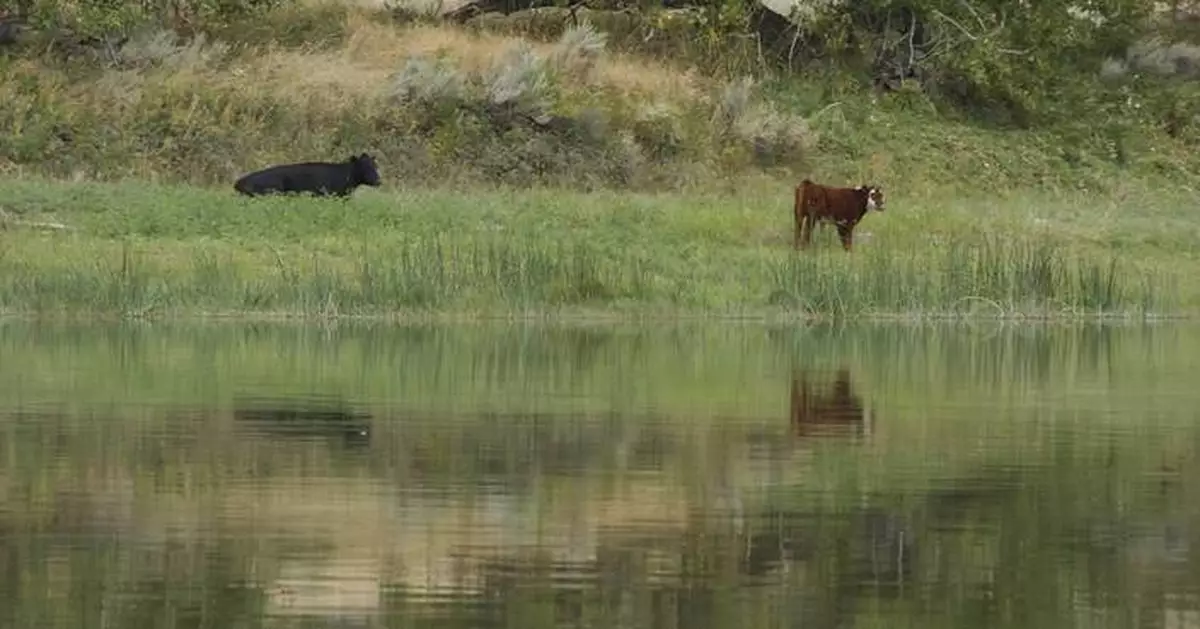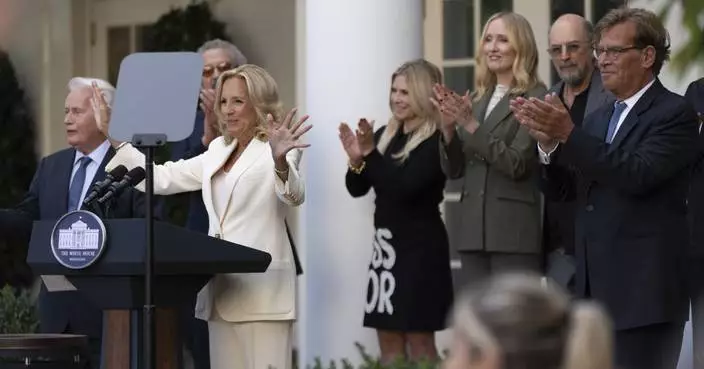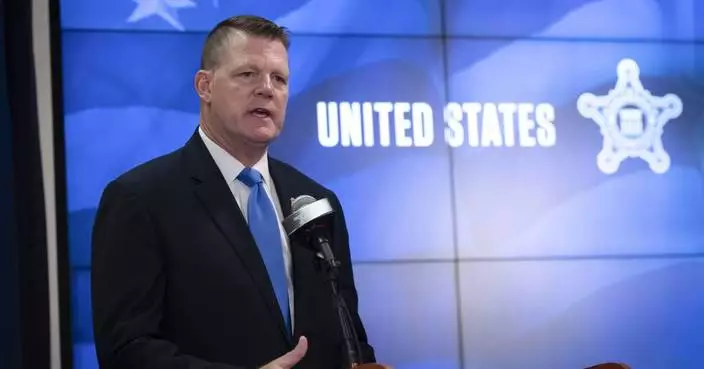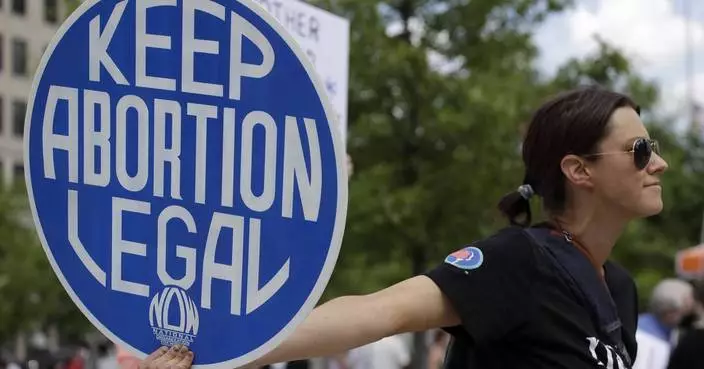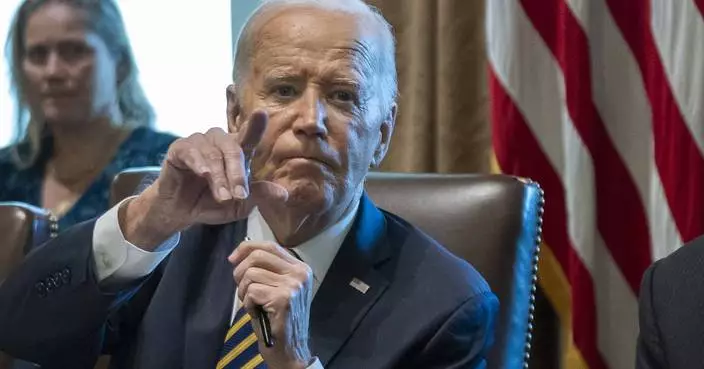BILLINGS, Mont. (AP) — The Biden administration on Thursday finalized a new rule for public land management that's meant to put conservation on more equal footing with oil drilling, grazing and other extractive industries on vast government-owned properties.
Officials pushed past strong opposition from private industry and Republican governors to adopt the proposal. GOP members of Congress said in response that they will seek to invalidate it.
The rule from the Interior Department's Bureau of Land Management — which oversees more than 380,000 square miles (990,000 square kilometers) of land, primarily in the U.S. West — will allow public property to be leased for restoration in the same way that oil companies lease land for drilling.
The rule also promotes the designation of more “areas of critical environmental concern” — a special status that can restrict development. It's given to land with historic or cultural significance or that's important for wildlife conservation.
The land bureau has a history of industry-friendly policies and for more than a century has sold grazing permits and oil and gas leases. In addition to its surface land holdings, the bureau regulates publicly-owned underground mineral reserves — such as coal for power plants and lithium for renewable energy — across more than 1 million square miles (2.5 million square kilometers).
Interior Secretary Deb Haaland said the changes would “restore balance” to how the U.S. government manages its public lands. The new rule continues the administration's efforts to use science to restore habitats and guide “strategic and responsible development,” Haaland said in a statement.
Environmentalists largely embraced the changes adopted Thursday, characterizing them as long overdue.
Trout Unlimited President Chris Wood said conservation already was part of the land bureau’s mission under the 1976 Federal Lands Policy Management Act. The new rule, he said, was “a re-statement of the obvious.”
“We are pleased to see the agency recognizing what the law already states — conservation is a vital use of our public lands,” he said.
But Republican lawmakers and industry representatives blasted the move as a backdoor way to exclude mining, energy development and agriculture from government acreage that's often cheap to lease. They contend the administration is violating the “multiple use” mandate for Interior Department lands, by catapulting the “non-use” of federal lands — meaning restoration leases — to a position of prominence.
“By putting its thumb on the scales to strongly favor conservation over other uses, this rule will obstruct responsible domestic mining projects,” said National Mining Association President Rich Nolan.
The rule’s adoption comes amid a flurry of new regulations from the Biden administration as the Democrat seeks reelection to a second term in November.
Government agencies in recent weeks tightened vehicle emissions standards to cut greenhouse gas emissions, finalized limits on PFAS chemicals in drinking water and increased royalty rates for oil companies that drill on public lands.
About 10% of all land in the U.S. falls under the Bureau of Land Management’s jurisdiction, putting the agency at the center of arguments over how much development should be allowed on public property.
Wyoming Sen. John Barrasso, a staunch Biden critic, on Thursday said he will introduce legislation to repeal the public lands rule. The Republican lawmaker alleged it would block access to areas that people in Wyoming depend on for mineral production, grazing and recreation.
"President Biden is allowing federal bureaucrats to destroy our way of life,” he said.
A property rights group that often sides with private interests said the rule would help promote voluntary conservation efforts. It will allow ranchers and others who use public lands to work with private organizations to restore streambeds, improve wildlife habitat and remove invasive weeds, said Brian Yablonski with the Property and Environment Research Center.
Democratic Rep. Raul Grijalva of New Mexico asserted that protecting public lands has wide support among the American people. Oil, gas and mining companies “have had the upper hand on our public lands for too long,” Grijalva said.
Restoration leases will not be issued if they would conflict with activity already underway on a parcel of land, officials said. They also said private industry could benefit from the program, since companies could buy leases and restore that acreage to offset damage they might do to other government-owned properties.
Those leases were referred to as “conservation leases” in the agency's original proposal last year. That was changed to “restoration leases” and “mitigation leases” in the final rule, but their purpose appears largely the same.
While the bureau previously issued leases for conservation purposes in limited cases, it has never had a dedicated program for it.
Bureau Director Tracy Stone-Manning has said the changes address the rising challenges of climate change and development. She told The Associated Press when the changes were announced last year that making conservation an “equal” to other uses would not interfere with grazing, drilling and other activities.
Former President Donald Trump tried to ramp up fossil fuel development on bureau lands, before President Joe Biden suspended new oil and gas leasing when he entered office. Biden later revived the deals to win West Virginia Democratic Sen. Joe Manchin’s support for the 2022 climate law.
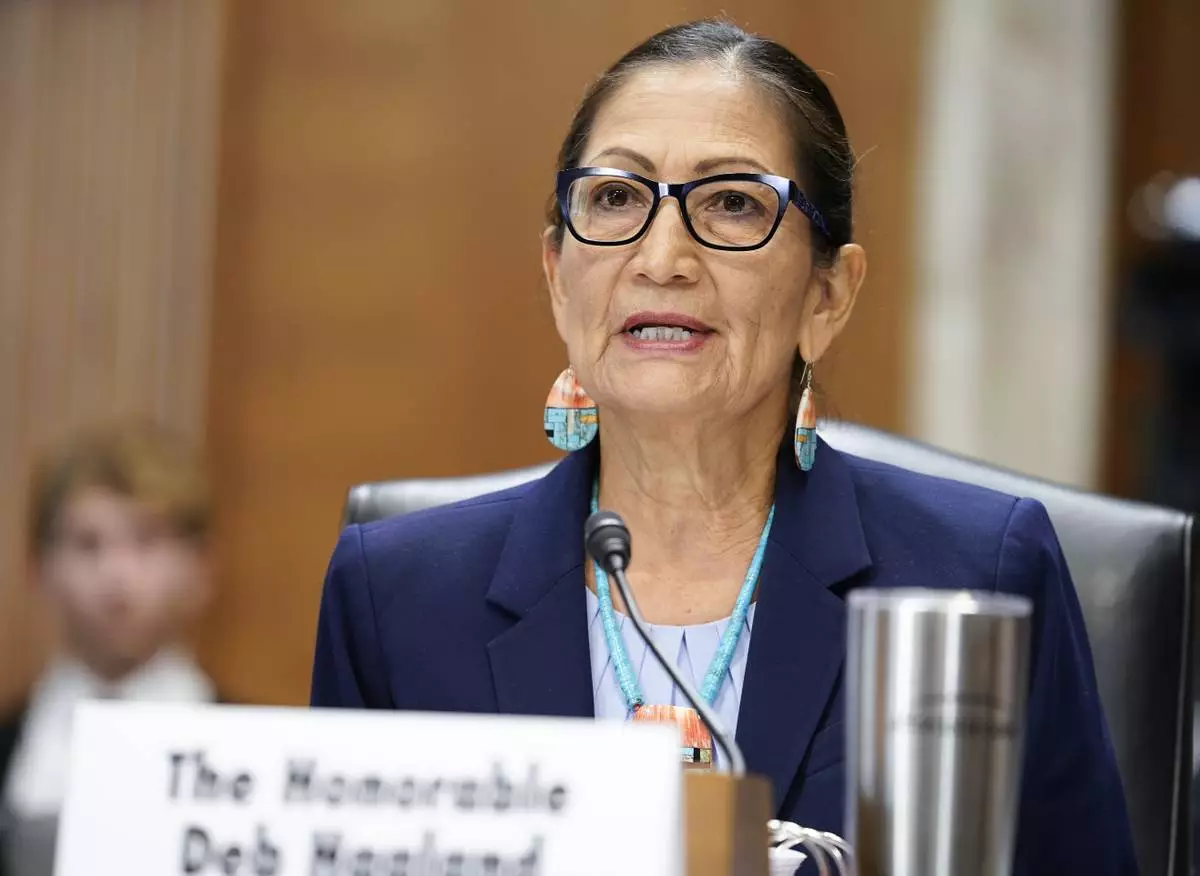
FILE - Interior Secretary Deb Haaland, speaks during a Senate Energy and Natural Resources Committee hearing on the budget request for fiscal year 2023 for the Department of the Interior, Thursday, May 19, 2022, on Capitol Hill in Washington. Haaland said a public lands rule emphasizing conservation that was finalized Thursday, April 18, 2024, by the Biden administration would restore balance to the management of vast U.S.-owned lands, primarily in western states. (AP Photo/Mariam Zuhaib, File)
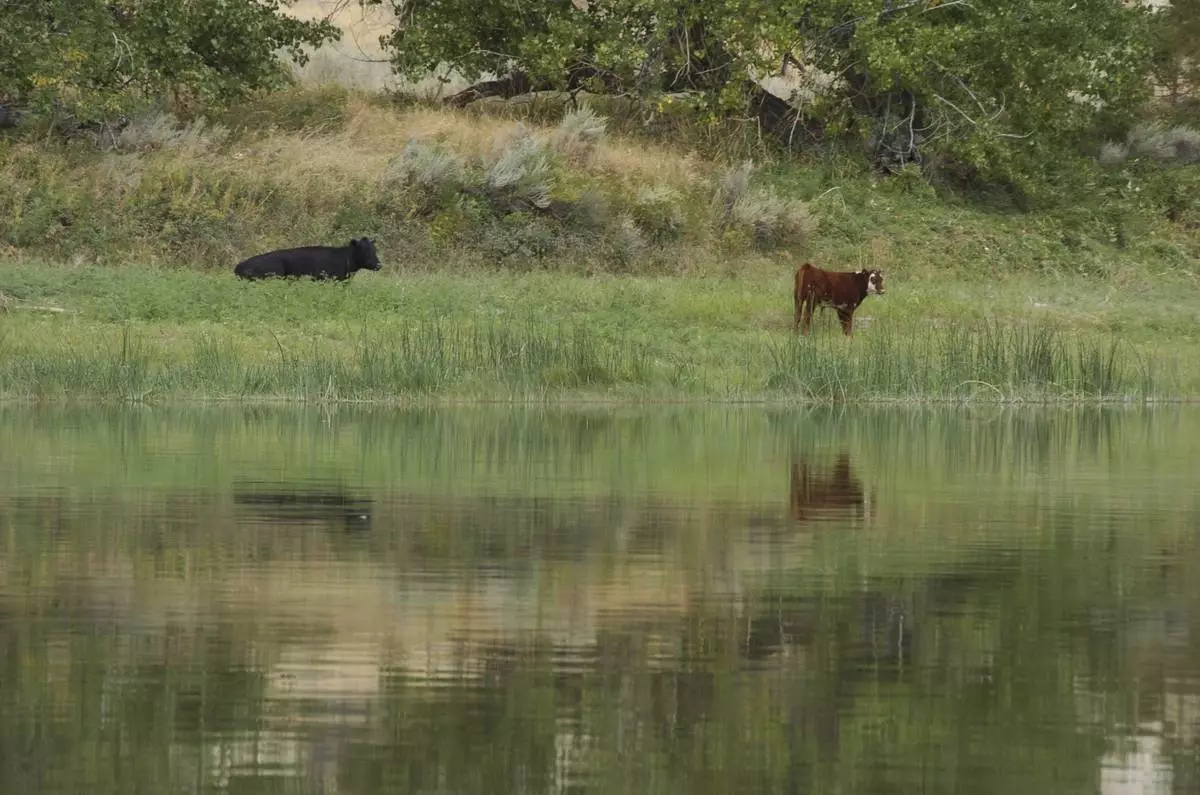
FILE - Cows graze along a section of the Missouri River that includes the Upper Missouri River Breaks National Monument on Sept. 19, 2011, near Fort Benton, Mont. The Biden administration on Thursday, April 18, 2024, finalized a proposed rule that’s meant to put conservation on equal footing with drilling, grazing and other uses of U.S.-owned lands, primarily in the West. (AP Photo/Matthew Brown, File)
COLUMBIA, S.C. (AP) — South Carolina put inmate Freddie Owens to death Friday as the state restarted executions after an unintended 13-year pause because prison officials couldn’t get the drugs needed for lethal injections.
Owens was convicted of the 1997 killing of a Greenville convenience store clerk during a robbery. While on trial, Owens killed a person incarcerated at a county jail. His confession to that attack was read to two different juries and a judge who all sentenced him to death.
Owens, 46, made no final statement. His last meal was two cheeseburgers, french fries, well-done ribeye steak, six chicken wings, two strawberry sodas and a slice of apple pie.
When the curtain to the death chamber opened, Owens was strapped to a gurney, his arms stretched to his sides. After the drug was administered, he said “bye” to his lawyer and she said “bye" to him.
He smiled slightly and his facial expression did not change much before he appeared to lose consciousness after about a minute. Then his eyes closed and he took several deep breaths. His breathing got shallower and his face twitched for another four or five minutes before the movements stopped.
A doctor came in and declared him dead a little over 10 minutes later at 6:55 p.m.
Owens' last-ditch appeals were repeatedly denied, including by a federal court Friday morning. Owens also petitioned for a stay of execution from the U.S. Supreme Court. South Carolina's governor and corrections director swiftly filed a reply, stating the high court should reject Owens' petition. The filing said nothing is exceptional about his case.
The high court denied the request shortly after the scheduled start time of the execution.
His last chance to avoid death was for Republican South Carolina Gov. Henry McMaster to commute his sentence to life in prison. McMaster denied Owens' request as well, stating that he had “carefully reviewed and thoughtfully considered” Owens' application for clemency.
Owens may be the first of several people to die in the state's death chamber at Broad River Correctional Institution. Five other people are out of appeals, and the South Carolina Supreme Court has cleared the way to hold an execution every five weeks.
South Carolina first tried to add the firing squad to restart executions after its supply of lethal injection drugs expired and no company was willing to publicly sell them more. But the state had to pass a shield law keeping the drug supplier and much of the protocol for executions secret to be able to reopen the death chamber.
To carry out executions, the state switched from a three-drug method to a new protocol of using just the sedative pentobarbital. The new process is similar to how the federal government kills people on death row, state prison officials said.
South Carolina law allows condemned people to choose lethal injection, the new firing squad or the electric chair built in 1912. Owens allowed his lawyer to choose how he died, saying he felt if he made the choice he would be a party to his own death, and his religious beliefs denounce suicide.
Owens changed his name to Khalil Divine Black Sun Allah while in prison, but court and prison records continue to refer to him as Owens.
Owens was convicted of killing Irene Graves in 1999. Prosecutors said he fired a shot into the head of the single mother of three who worked three jobs when she said she couldn't open the store's safe.
Hanging over his case was another killing: After his conviction, but before he was sentenced in Graves’ killing, Owens fatally attacked Christopher Lee, whom he was incarcerated with at a county jail.
Owens gave a detailed confession about how he stabbed Lee, burned his eyes, choked and stomped him, ending by saying he did it “because I was wrongly convicted of murder,” according to an investigator's written account.
The confession was read to each jury and judge who went on to sentence Owens to death. Owens had two different death sentences overturned on appeal only to end up back on death row.
Owens was charged with murder in Lee's death but was never tried. Prosecutors dropped the charges with the right to restore them in 2019 around the time Owens ran out of regular appeals.
In his final appeal, Owens' lawyers said prosecutors never presented scientific evidence that Owens pulled the trigger when Graves was killed and the chief evidence against him was a co-defendant who pleaded guilty and testified that Owens was the killer.
Owens’ attorneys provided a sworn statement two days before the execution from Steven Golden saying Owens was not in the store, contradicting his trial testimony. Prosecutors said other friends of Owens and his former girlfriend testified that he bragged about killing the clerk.
Owens' lawyers also said he was just 19 when the killing happened and that he had brain damage from physical and sexual violence while in a juvenile prison.
“Mr. Owens’s childhood was marked by suffering on a scale that is hard to comprehend. He spent his adulthood in prison for a crime that he did not commit,” attorney Gerald “Bo” King said in a statement following Owens’ execution. “The legal errors, hidden deals, and false evidence that made tonight possible should shame us all.”
South Carolinians for Alternatives to the Death Penalty held a vigil outside the prison about 90 minutes before Owens was scheduled to die.
South Carolina’s last execution was in May 2011. It took a decade of wrangling in the Legislature — first adding the firing squad as a method and later passing a shield law — to get capital punishment restarted.
South Carolina has put 43 people to death since the death penalty was restarted in the U.S. in 1976. In the early 2000s, it was carrying out an average of three executions a year. Only nine states have put more people to death.
Since the unintentional execution pause, South Carolina’s death row population has dwindled. The state had 63 condemned people in early 2011. It now has 31 after Owens' death Friday. About 20 people have been taken off death row and received different prison sentences after successful appeals. Others have died of natural causes.
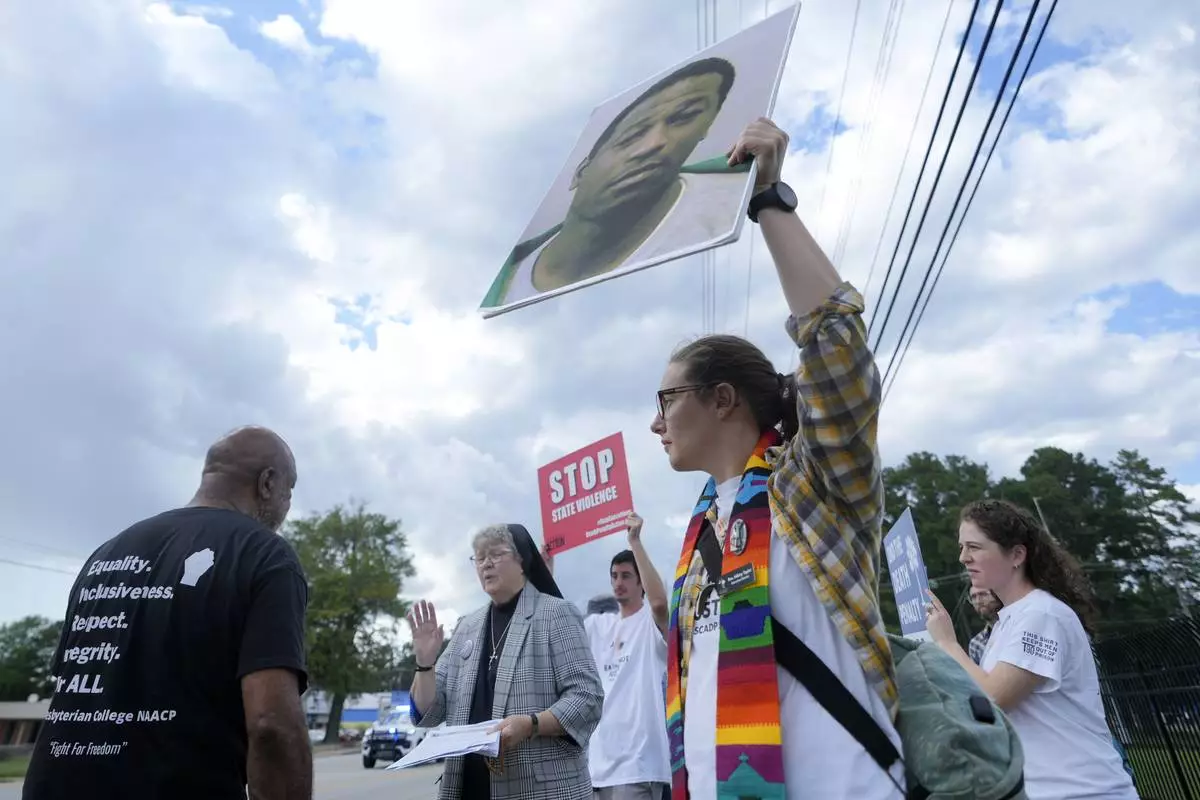
Rev. Hillary Taylor protests the planned execution of Freddie Eugene Owens, 46, on Friday, Sept. 20, 2024, in Columbia, S.C. Owens is set to be the first person to be executed in South Carolina in 13 years. (AP Photo/Chris Carlson)
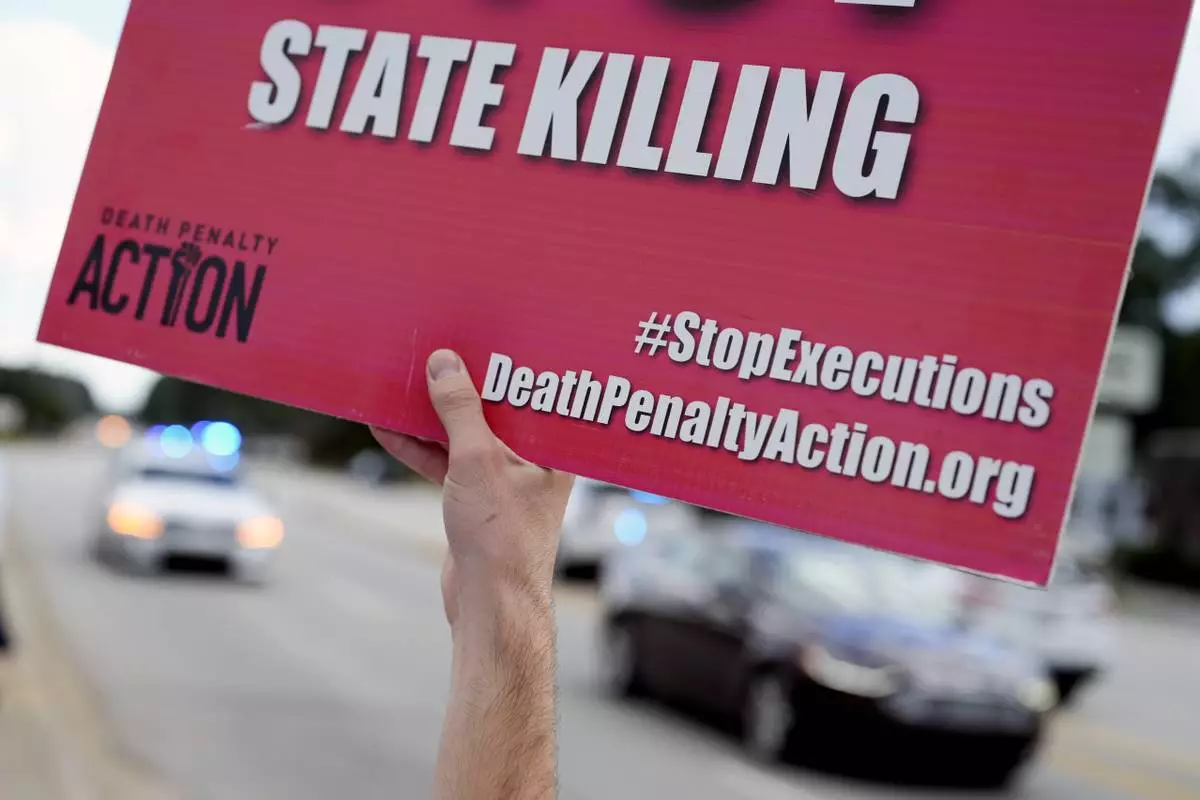
A demonstrators protests the planned execution of Freddie Eugene Owens, 46, on Friday, Sept. 20, 2024, in Columbia, S.C. Owens is set to be the first person to be executed in South Carolina in 13 years. (AP Photo/Chris Carlson)
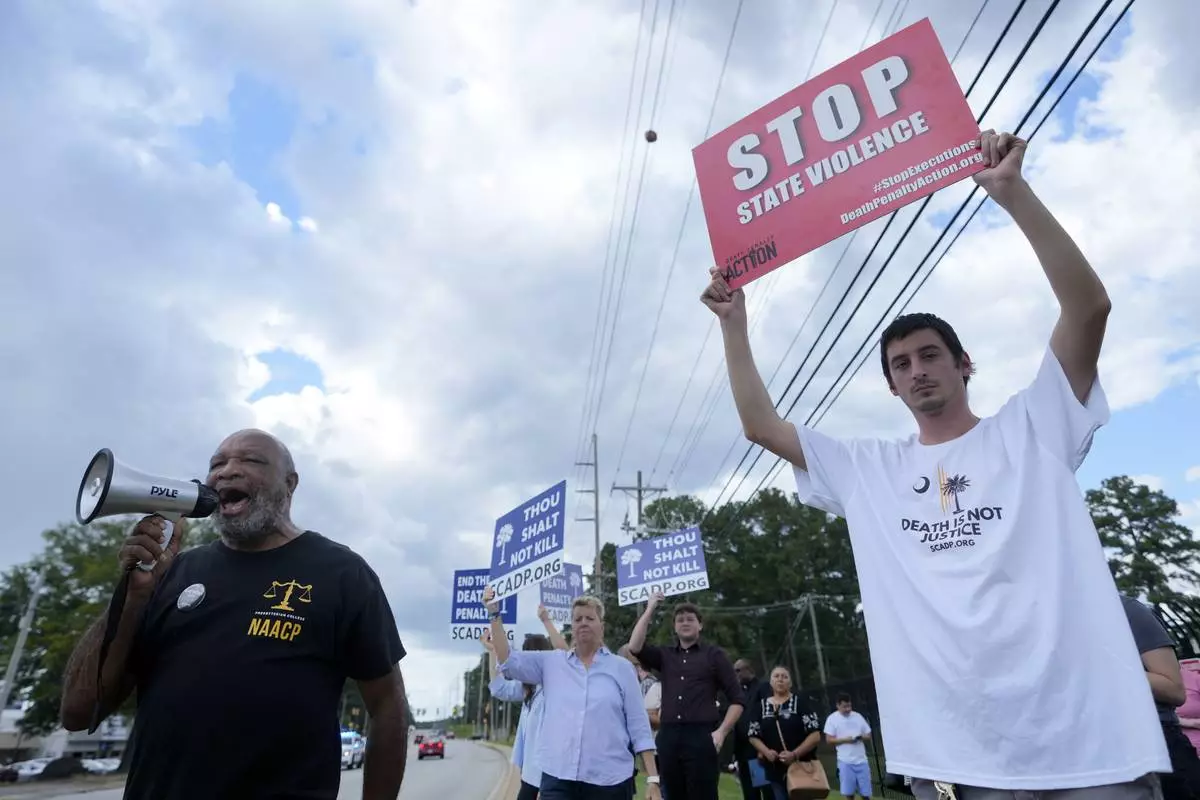
Jesse Motte, right, protests the planned execution of Freddie Eugene Owens, 46, on Friday, Sept. 20, 2024, in Columbia, S.C. Owens is set to be the first person to be executed in South Carolina in 13 years. (AP Photo/Chris Carlson)
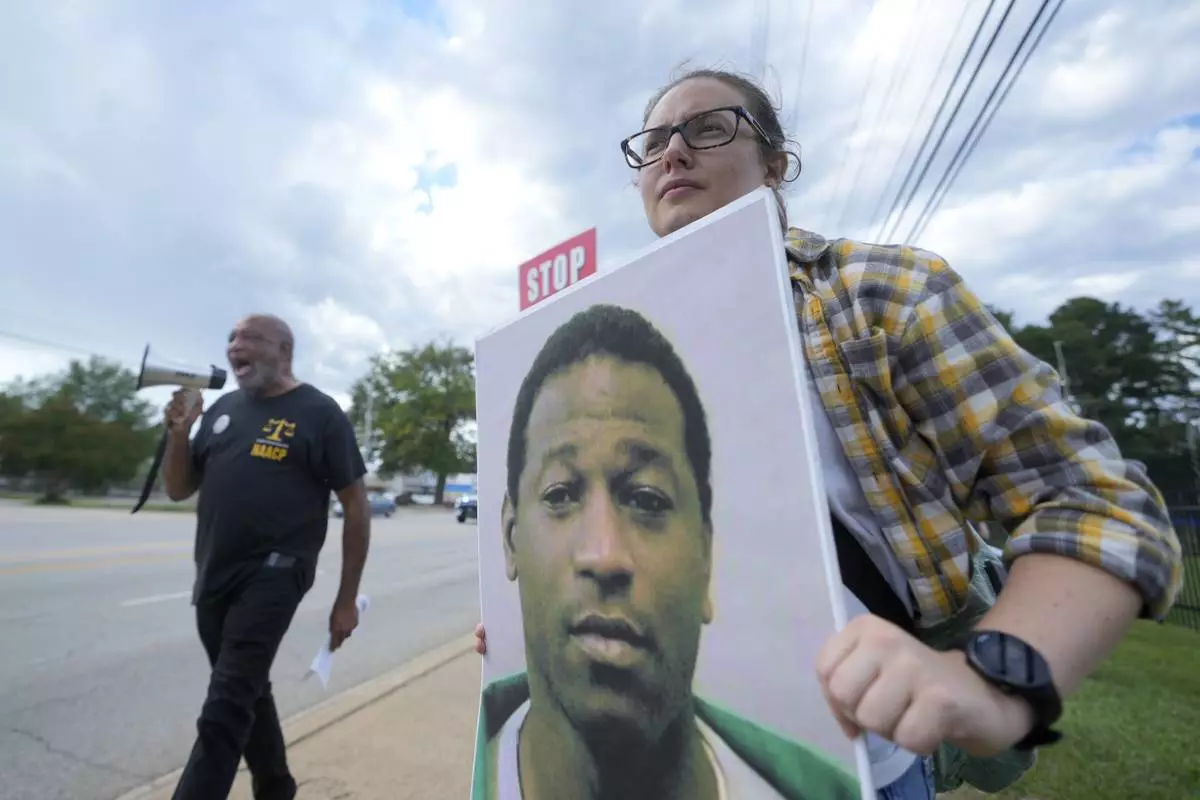
Rev. Hillary Taylor protests the planned execution of Freddie Eugene Owens, 46, on Friday, Sept. 20, 2024, in Columbia, S.C. Owens is set to be the first person to be executed in South Carolina in 13 years. (AP Photo/Chris Carlson)
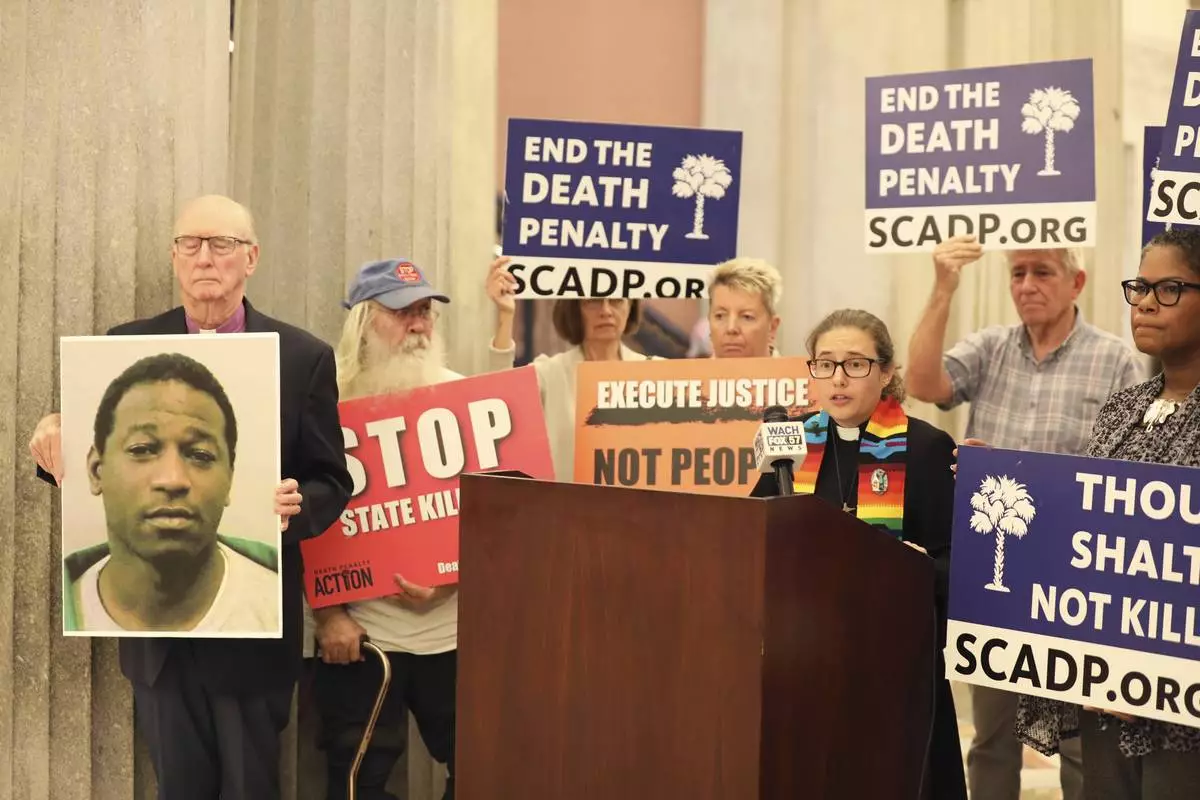
South Carolinians for Alternatives to the Death Penalty Executive Director Rev. Hillary Taylor speaks at a news conference before delivering petitions to stop the execution of Freddie Owens at the South Carolina Statehouse in Columbia, S.C., Thursday, Sept. 19, 2024. (AP Photo/Jeffrey Collins)
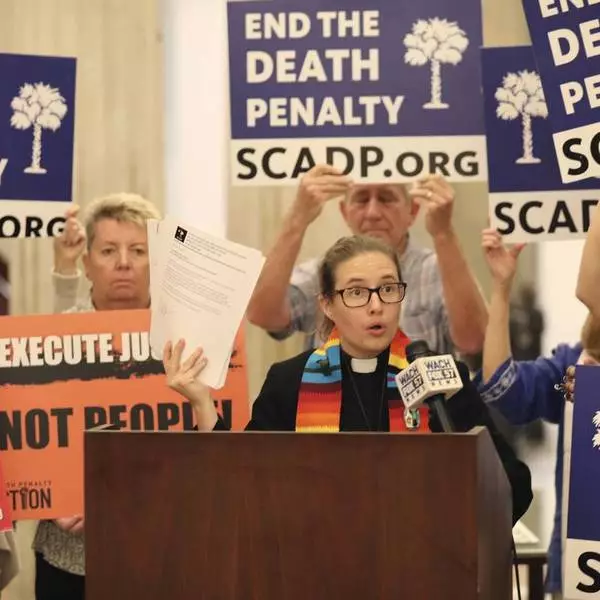
South Carolina prepares for first execution in 13 years
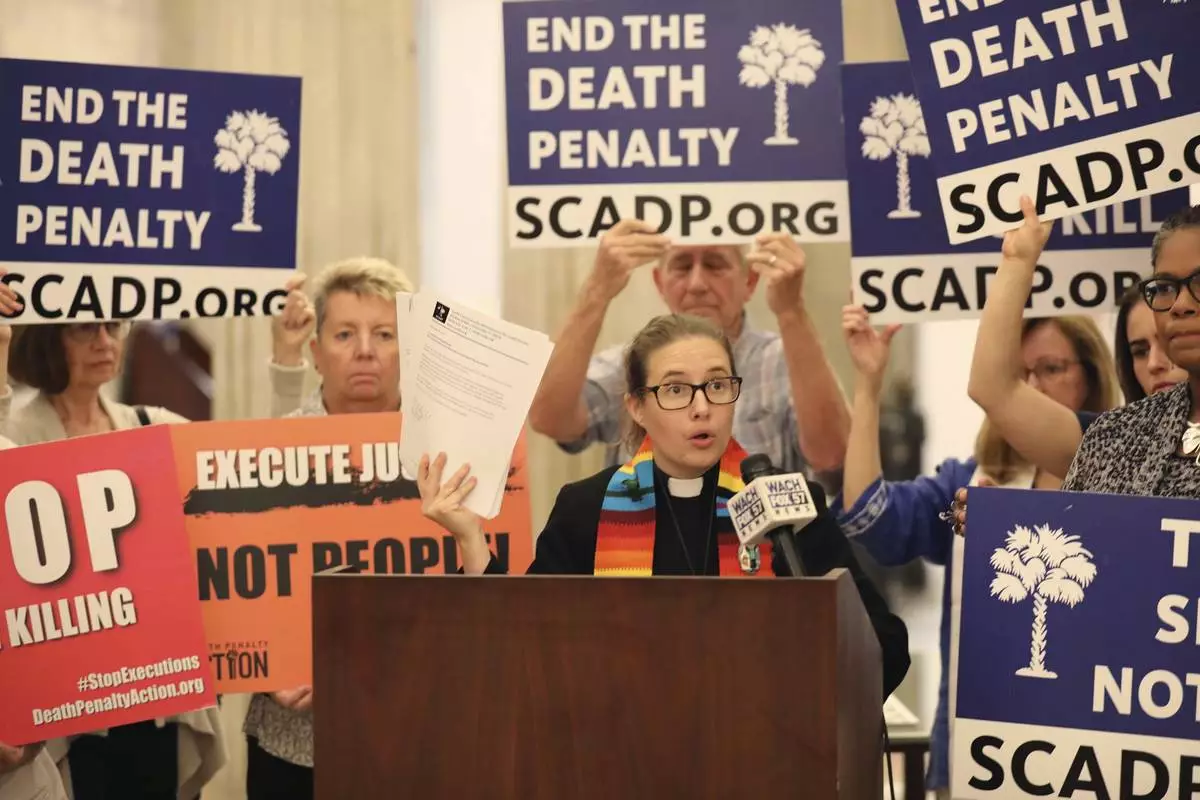
South Carolinians for Alternatives to the Death Penalty Executive Director Rev. Hillary Taylor speaks at a news conference before delivering petitions to stop the execution of Freddie Owens at the South Carolina Statehouse in Columbia, S.C., Thursday, Sept. 19, 2024. (AP Photo/Jeffrey Collins)
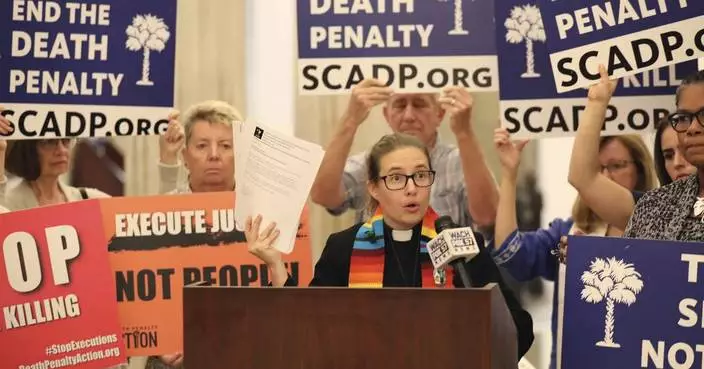
South Carolina prepares for first execution in 13 years




